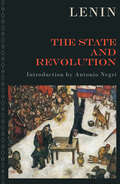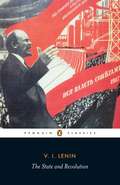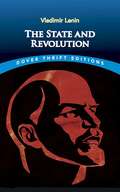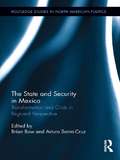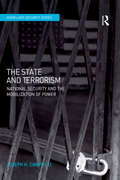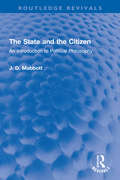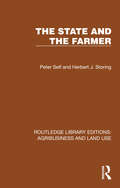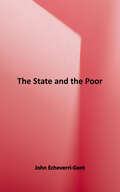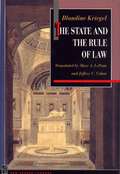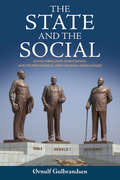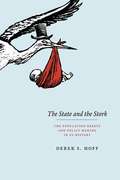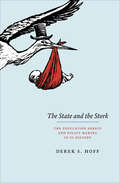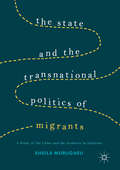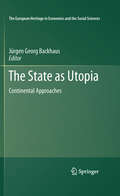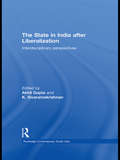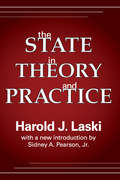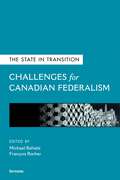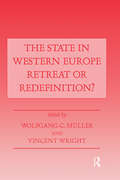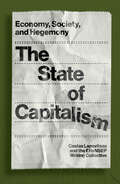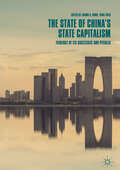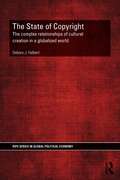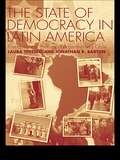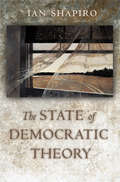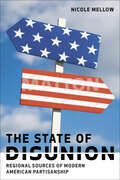- Table View
- List View
The State and Revolution
by V. I. LeninLenin's most important and controversial theoretical textLenin&’s booklet The State and Revolution struck the world of Marxist theory like a lightning bolt. Written in the months running up to the October Revolution of 1917, Lenin turned the traditional socialist concept of the state on its head, arguing for the need to smash the organs of the bourgeois state to create a &‘semi-state&’ of soviets, or workers&’ councils, in which ordinary people would take on the functions of the state machine in a new and radically democratic manner.This new edition includes a substantial introduction by renowned theorist Antonio Negri, who argues for the continued relevance of these ideas.
The State and Revolution
by Vladimir LeninIn July 1917, when the Provisional Government issued a warrant for his arrest, Lenin fled from Petrograd; later that year, the October Revolution swept him to supreme power. In the short intervening period he spent in Finland, he wrote his impassioned, never-completed masterwork The State and Revolution. This powerfully argued book offers both the rationale for the new regime and a wealth of insights into Leninist politics. It was here that Lenin justified his personal interpretation of Marxism, savaged his opponents and set out his trenchant views on class conflict, the lessons of earlier revolutions, the dismantling of the bourgeois state and the replacement of capitalism by the dictatorship of the proletariat. As both historical document and political statement, its importance can hardly be exaggerated.Translated and edited with an introduction by Robert Service
The State and Revolution (Dover Thrift Editions)
by Vladimir Ilyich LeninAmong the most influential political and social forces of the twentieth century, modern communism rests firmly on philosophical, political, and economic underpinnings developed by Vladimir Ilyich Ulyanov, later known as Lenin. The State and Revolution is Lenin's most significant work, in which he totally rejects the institutions of Western democracy and presents his vision of the final perfection of Communism. For anyone who seeks to understand the twentieth century, capitalism, the Russian revolution, and the role of Communism in the tumultuous political and social movements that have shaped the modern world, this book offers unparalleled insight and understanding.
The State and Security in Mexico: Transformation and Crisis in Regional Perspective (Routledge Studies in North American Politics)
by Brian Bow Arturo Santa-CruzAt the turn of the millennium, Mexico seemed to have finally found its path to political and economic modernization; a state which had been deeply embedded in society was being pulled out, with new political leaders allowing market forces to play a greater role in guiding the nation’s economic development, and allowing old patron-client networks to crumble. At the same time, many hoped that political and legal reforms would increase the state’s capacity to provide prosperity, security, and equity for its citizens. In the midst of this historic transformation, however, Mexico was confronted with an urgent new policy challenge. Internationally recognized experts from the academic and think-tank communities in the United States, Mexico, and Canada consider the origins of the current crisis in Mexico, and the nature and effectiveness of the Calderón government’s response. Simply not another book on North American regional security, this volume uses Joel Migdal’s concept of "the state in society" to provide a refreshingly clear and accessible exploration of political change in the developing world. The engagement with the US and Canada gives the reader a chance to observe the dynamics of persuasion across the developmental divide. Four key questions structure the study: What does the ongoing security crisis in Mexico tell us about the changing role of the state in society there? What does the changing role of the state tell us about the nature (and intractability) of the crisis? How has the transition to democracy affected the links between the state and organized crime in Mexico, and the state’s capacity to contain non-state challengers? What kinds of political and legal reforms are called for, and what effects can we expect them to have on the extent and intensity of violence in Mexico? No other study comprehensively uncovers new conceptual and theoretical insights in each of these areas whilst offering some practical guidance for policy-makers and publics seeking to understand these urgent and complex challenges.
The State and Terrorism: National Security and the Mobilization of Power (Homeland Security)
by Joseph H. IiAdopting an innovative approach to the ongoing debate over homeland security and state response to terrorism, Joseph Campos investigates the contextualizing of national security discourse and its management of terrorism. New ideas developed in this book reflect ways in which national security is mobilized through specific discourse to manage threats. In addition, a review of presidential rhetoric over the last 30 years reveals that national security discourse has maintained an ideological hegemony to determine what constitutes violence and appropriate responses. The volume incorporates historical depth and critical theory in a comparative framework to provide an invaluable insight into how national security is developed and how it works with the concept of terrorism to secure the state.
The State and the Citizen: An Introduction to Political Philosophy (Routledge Revivals)
by J. D. MabbottFirst published in 1948, The State and the Citizen traces the development of the idea of the State as the ultimate source of authority. The author then proceeds to suggest the proper ends and limitation of State action. He analyses the conceptions of State unity and corporate loyalty and ends with a discussion on the relations between States and other associations, and between one State and another. This short and lucid introduction to political philosophy is an essential read for students and scholars of political philosophy, philosophy, and political studies.
The State and the Farmer (Routledge Library Editions: Agribusiness and Land Use #23)
by Peter Self Herbert J. StoringOriginally published in 1987, this book is written primarily for planners, public administrators and project managers in countries or international agencies considering a development strategy in which agribusiness and rural enterprise projects are viewed as a desirable policy instrument for generating employment and income. It makes available the background and methodology of project analysis so that agribusiness and rural enterprise project can be designed, implemented and reviewed effectively in a wide range of circumstances. It outlines how to establish objectively the potential and limitations of agribusiness and rural enterprise projects; provides guidelines for deciding whether a project can be effective; considers the policy issues relating to such projects and suggests techniques for judging project performance.
The State and the Poor: Public Policy and Political Development in India and the United States
by John Echeverri-GentThis comparison of rural development in India and the United States develops important departures from economic and historical institutionalism. It elaborates a new conceptual framework for analyzing state-society relations beginning from the premise that policy implementation, as the site of tangible exchanges between state and society, provides strategic interaction among self-interested individuals, social groups, and bureaucracies. It demonstrates how this interaction can be harnessed to enhance the effectiveness of public policy. <p><p>Echeverri-Gent's application of this framework to poverty alleviation programs generates provocative insights about the ways in which institutions and social structure constrain policy-makers. In the process, he illuminates new implications for the concepts of state autonomy and state capacity. The book's original conceptual framework and intriguing findings will interest scholars of South Asia and American politics, social theorists, and policy-makers.
The State and the Private Sector in Latin America
by Mauricio FontThis book follows ten political economic histories since the 1970s, showing how different forms of partnership have developed, flourished or declined over the time. The author's argument is supported by rich empirical material. It places partnership schemes in a broader social context and provides a deep insight into the phenomenon.
The State and the Rule of Law (New French Thought Series)
by Blandine KriegelBlandine Kriegel, at one time a collaborator with Michel Foucault, is one of France's foremost political theorists. This translation of her celebrated work L'Etat et les esclaves makes available for English-speaking readers her impassioned defense of the state. Published in France in 1979 and republished in 1989, this work challenged not only the anti-statism of the 1960s but also generations of romanticism in politics that, in Kriegel's view, inadvertently threatened the cause of liberty by refusing to distinguish between the despotic and the lawful state.In a work that addresses the urgent concerns of Europe and the contemporary world as a whole, Kriegel examines the background of modern liberal democracy in the late seventeenth and eighteenth centuries and argues cogently for the future of constitutional social-democracy. She maintains, among other positions, that European liberal democracies would have been impossible without the political basis provided by the lawful state first developed by monarchies. She also shows that early modern centralized states became liberal insofar as they developed a centralized legal system, rather than a centralized administration. In developing these ideas, she presents a picture of the state as a major force for human liberty.
The State and the Social: State Formation in Botswana and its Precolonial and Colonial Genealogies
by Ørnulf GulbrandsenBotswana has been portrayed as a major case of exception in Africa—as an oasis of peace and harmony with an enduring parliamentary democracy, blessed with remarkable diamond-driven economic growth. Whereas the “failure” of other states on the continent is often attributed to the prevalence of indigenous political ideas and structures, the author argues that Botswana’s apparent success is not the result of Western ideas and practices of government having replaced indigenous ideas and structures. Rather, the postcolonial state of Botswana is best understood as a unique, complex formation, one that arose dialectically through the meeting of European ideas and practices with the symbolism and hierarchies of authority, rooted in the cosmologies of indigenous polities, and both have become integral to the formation of a strong state with a stable government. Yet there are destabilizing potentialities in progress due to emerging class conflict between all the poor sections of the population and the privileged modern elites born of the expansion of a beef and diamond-driven political economy, in addition to conflicts between dominant Tswana and vast other ethnic groups. These transformations of the modern state are viewed from the long-term perspectives of precolonial and colonial genealogies and the rise of structures of domination, propelled by changing global forces.
The State and the Stork: The Population Debate and Policy Making in US History
by Derek S. HoffFrom the colonial era to the present, the ever-shifting debate about America's prodigious population growth has exerted a profound influence on the evolution of politics, public policy, and economic thinking in the United States. In a remarkable shift since the late 1960s, Americans of all political stripes have come to celebrate the economic virtues of population growth. As one of the only wealthy countries experiencing significant population growth in the twenty-first century, the United States now finds itself at a demographic crossroads, but policymakers seem unwilling or unable to address the myriad economic and environmental questions surrounding this growth. From the founders' fears that crowded cities would produce corruption, luxury, and vice to the zero population growth movement of the late 1960s to today's widespread fears of an aging crisis as the Baby Boomers retire, the American population debate has always concerned much more than racial composition or resource exhaustion, the aspects of the debate usually emphasized by historians. In The State and the Stork, Derek Hoff draws on his extraordinary knowledge of the intersections between population and economic debates throughout American history to explain the many surprising ways that population anxieties have provoked unexpected policies and political developments--including the recent conservative revival. At once a fascinating history and a revelatory look at the deep origins of a crucial national conversation, The State and the Stork could not be timelier.
The State and the Stork: The Population Debate and Policy Making in US History
by Derek S. Hoff&“A powerful model of how to understand the complex array of issues that will shape the political economy of population in the future.&”—American Historical Review From the founders&’ fears that crowded cities would produce corruption, luxury, and vice to the zero population growth movement of the late 1960s to today&’s widespread fears of an aging crisis as the Baby Boomers retire, the American population debate has always concerned much more than racial composition or resource exhaustion, the aspects of the debate usually emphasized by historians. In The State and the Stork, Derek Hoff draws on his extraordinary knowledge of the intersections between population and economic debates throughout American history to explain the many surprising ways that population anxieties have provoked unexpected policies and political developments—including the recent conservative revival. At once a fascinating history and a revelatory look at the deep origins of a crucial national conversation, The State and the Stork could not be timelier. &“Hoff has done a real service by bringing to the foreground the economic dimension of U.S. debates over population size and growth, a topic that has been relegated to the shadows for too long.&”—Population and Development Review &“After decades of failed efforts by the scientific community to alert the public to the environmental dangers of population growth and overpopulation, a first-rate historian has finally detailed both the arguments and their policy implications . . . Everyone interested in population should read The State and the Stork. This is an incredibly timely book.&”—Paul R. Ehrlich, author of The Population Bomb
The State and the Transnational Politics of Migrants: A Study of the Chins and the Acehnese in Malaysia
by Sheila MurugasuThis book is an exploration of the various types of transnational politics that the Chin and Acehnese people are engaged in, particularly in the Malaysian state. As with so many migrants elsewhere in the world who try to organize themselves transnationally, the Chin and Acehnese have needed to negotiate a challenging socio-political landscape that is the Malaysian state. Here, the author illustrates that migrants don't just travel with their hopes for the future, but with grievances and identities which are rooted in their homelands. This is a book for those interested in reading an account that reflects the complexities of migrant life in the 21st century - an era replete with fluid labour markets, deregulated air travel, porous borders and political leaders who move transnationally, acting as binding agents for the far-flung communities they seek to represent.
The State as Utopia
by Jürgen BackhausThis book examines utopias in classical political economy and is based on the papers presented by leading scholars at the 22nd Heilbronn Symposium in the Economics and the Social Sciences. The book focuses on the tension between the State and utopia (the State as utopia vs. utopia instead of a state). The contributors also study the question of whether seafaring and landlocked states visualize the commonwealth differently and develop different utopias, and it is concluded they do not. The volume therefore follows the refutation of the Schumpeterian Hypothesis that more concentrated industries stimulate innovation. Though the hypothesis is refuted it still remains important, the chapters argue, because it charts out an entire research program, serves as a benchmark of definite public and private sector boundaries, and defines the grammar of discourse for constitutional economic policy in OECD states. These themes are explored in detail through contributions by economists, philosophers, and social historians. The contributors examine utopias hitherto never or rarely reviewed in the English language, making this book of interest to students and scholars in economics, political science and the history of economic thought.
The State in India after Liberalization: Interdisciplinary Perspectives (Routledge Contemporary South Asia Series)
by Akhil GuptaThis book assesses the impact of liberalization on practices of government and relations between state and society. It is clear that liberalization as state policy has complex forms of regulation and deregulation inbuilt, and these policies have resulted in dramatic increases in productivity and economic wealth but also generated spectacular new forms of inequality between social groups, regions, and sectors. Through a detailed examination of the Indian state, the contributors - all experts in their respective fields - explore questions such as: Have the new inequalities resulted in greater social unrest and violence? How has the meaning of citizenship changed? What will the long-term effects of regional economic imbalances be on migration, employment, and social welfare? Will increasing federalism result in new problems? Will smaller governments be more effective in providing basic necessities such as clothing, housing, food, water, and sanitation to citizens? What does liberalization mean to Indians in cities and villages, in small towns, and metropolises, in poor, middle class, or wealthy homes? Are concepts like social capital, decentralization, private enterprise, and grass-roots globalization effective in analyzing the post-liberalization state, or are new concepts needed? By focusing on what specifically has changed about the state after liberalization in India, this volume will shed light on comparative questions about the process of neoliberal restructuring across the world. As such, it will be of interest to scholars of a variety of disciplines, including sociology, anthropology, political science, geography, international studies, public policy, environmental studies and economics.
The State in Theory and Practice
by Harold LaskiThis timeless classic by Harold J. Laski explains the nature of the modern state by examining its characteristics, as revealed by its history. The State in Theory and Practice is a work that grows in significance, rather than dwindles over time. This is because, as Sidney A. Pearson, Jr. points out, Laski helped develop and expound the foundational arguments of the political left.After the collapse of the Soviet Union, even on the hard left, few people thought of Marxism, at least in its classical formulation by Laski in the 1930s, as a political alternative. Much of the interest in Laski seeks to separate the early Laski of pluralist parliamentary arguments from the later Laski of Marxism. Laski's appeal rests on subtle aspects of his science of politics that require a detailed examination before their full significance can be understood. The state is a work that operates at several layers of assumptions and implications.The significance of Laski starts with the observation that among many intellectuals on the left, the political critique of liberal democracy remains as influential after the collapse of the Soviet Union as it was when Laski wrote. The leftist critique of classical liberalism is one of the touchstones of modern political thought and Laski remains part of that tradition. Laski is one of the links between what might be called the ""old left"" of the pre-World War II era and the ""new left"" of the 1960's and later.
The State in Transition: Challenges for Canadian Federalism
by Brooke Jeffrey Peter Graefe Raffaele Iacovino Thomas O. Hueglin Geoffrey Hale Geneviève Nootens Patrick Fafard Daniel Bourgeois Robert Talbot Jeremy A. Clarke M François Rocher Andrew Bourns France MorrissetteCanadian federalism, as a particular form of political organization for a complex society—with multiple economic, political, geographic, cultural, and national divides—faces important challenges. The political realignment that brought the Conservative Party to power in the last quinquennium has set in motion a significant transformation of the Canadian state and its federal system of governance. The contributors in this collection focus on three recurrent themes: the issues arising from the management of ethno-cultural diversity; the existence of internal nations in Canada (the First Nations and the Quebec nation in Quebec), the presence of linguistic minorities (French and English), and the questions of identity linked to citizenship in a federal context that allows for the presence of multiple loyalties; and the specific challenges raised by globalization and the extension of economic integration, particularly between the United States and Canada. This collection of studies on the role of the state reveals that our understanding of the evolution of the Canadian state, and of the ensuing impact on federalism and federal-provincial relations, is not as complete as it should be.
The State in Western Europe: Retreat or Redefinition?
by Wolfgang C. Müller Vincent WrightFocusing exclusively on the functional rather than the territorial level, this book reveals that the reshaping of the state in western Europe involves different policies across Europe and conflicting tendencies in the impact of the various reform programmes. Whilst the state may be in retreat in some respects, its activity may be increasing in others. And nowhere, not even in Britain, has its key decision-making role been seriously undermined.
The State of Capitalism: Economy, Society, and Hegemony
by Costas Lapavitsas EReNSEP Writing CollectiveThinking beyond pandemic capitalismThe health emergency that broke out in 2020 is a landmark event in the development of capitalism, confirming the underlying change signalled by the Great Crisis of 2007-9. The pandemic has catapulted the state to the centre of economic activity. However, a historic impasse is steadily becoming apparent at the core of the world economyProductive accumulation is flaccid, as both profitability and labour productivity are weak. Financialisation has entered a new phase, as &“shadow banking&” grew relative to other banks but is entirely dependent on the state. The power of the state derives from command over fiat money and can certainly deliver enormous boosts to aggregate demand, but that is not enough to tackle the weakness of the productive sector.The rise in inflation for the first time in forty years indicates the impasse. There is a transparent need for intervention on the supply side, directly challenging capitalist property rights. There is no evidence, however, that the ruling blocs in core countries would engage in such policies.The pandemic crisis also brought to the fore fresh divisions of core and periphery across the world economy. Imperialism has assumed new forms, spurred by globally active financial capital and internationalised productive capital. A renewed contest for hegemony has emerged as US power declined. The economic challenge of China will unfold steadily in the years ahead, intensifying political tensions and military rivalries.This book is the work of a research collective comprising authors from several parts of the world. It analyses these vital issues from the perspective of Marxist political economy and puts forth alternative anticapitalist proposals.
The State of China’s State Capitalism: Evidence of Its Successes and Pitfalls
by Juann H. Hung Yang ChenThis book comprises a collection of well-researched essays on selected contemporary economic and finance issues in China, making a timely contribution to the intellectual intercourse regarding the implications of China’s rise. These essays analyze issues related to the state of China’s ecology, real estate market, inbound and outbound FDI, income inequality, etc., and offer analysis on the policy and institutional causes of those issues. Readers will be able to infer their implications for business opportunities in China and the tradeoff / tension between economic growth and social welfare. Moreover, this book introduces an array of data and data sources useful to scholars and practitioners interested in studying the Chinese model of economic growth. This book will be a valuable resource to journalists and scholars trying to gain insight into China’s extraordinary pace of growth in the past three decades.
The State of Copyright: The complex relationships of cultural creation in a globalized world (RIPE Series in Global Political Economy)
by Debora HalbertThis book seeks to make an intervention into the ongoing debate about the scope and intensity of global copyright laws. While mapping out the primary actors in the context of globalization and the modern political economy of information ownership, the argument is made that alternatives to further expansion of copyright are necessary. By examining the multiple and competing interests in creating the legal regime of copyright law, this books attempts to map the political economy of copyright in the information age, critique the concentration of ownership that is intrinsic in the status quo, and provide an assessment of the state of the contemporary global copyright landscape and its futures. It draws upon the current narratives of copyright as produced by corporate, government, and political actors and frames these narratives as language games within a global political project to define how information and culture will be shared and exchanged in the future. The text problematizes the relationship of the state to culture, comments on the global flows of culture, and critiques the regulatory apparatus that is in place to commodify culture and align it with the contemporary nation-state. In the end, the possibility of non-commodified and more open futures are explored. The State of Copyright will be of particular interest for students and scholars of international political economy, law, political science, anthropology, sociology, cultural studies, library sciences, and communication studies. It also will appeal to a growing popular audience that has taken an interest in the issues of copyright.
The State of Democracy in Latin America: Post-Transitional Conflicts in Argentina and Chile
by Laura Tedesco Jonathan R. BartonThe State of Democracy in Latin America presents a critical analysis of the contemporary democratic state in Latin America.In a shift away from the more typical analyses of Latin American political change during the 1990s, this book presents a more state-centric perspective that seeks to explain why transitions to democracy and trends towards better governance have failed to provide more political and social stability in the continent. Through a deeper analysis of underlying social relations and values and how these manifest themselves through institutions, the state is understood not purely as an institutional form but rather as a set of interdependent relations that are shaped by particular collective and individual interests.
The State of Democratic Theory
by Ian ShapiroWhat should we expect from democracy, and how likely is it that democracies will live up to those expectations? In The State of Democratic Theory, Ian Shapiro offers a critical assessment of contemporary answers to these questions, lays out his distinctive alternative, and explores its implications for policy and political action. Some accounts of democracy's purposes focus on aggregating preferences; others deal with collective deliberation in search of the common good. Shapiro reveals the shortcomings of both, arguing instead that democracy should be geared toward minimizing domination throughout society. He contends that Joseph Schumpeter's classic defense of competitive democracy is a useful starting point for achieving this purpose, but that it stands in need of radical supplementation--both with respect to its operation in national political institutions and in its extension to other forms of collective association. Shapiro's unusually wide-ranging discussion also deals with the conditions that make democracy's survival more and less likely, with the challenges presented by ethnic differences and claims for group rights, and with the relations between democracy and the distribution of income and wealth. Ranging over politics, philosophy, constitutional law, economics, sociology, and psychology, this book is written in Shapiro's characteristic lucid style--a style that engages practitioners within the field while also opening up the debate to newcomers.
The State of Disunion: Regional Sources of Modern American Partisanship
by Nicole MellowWhy are some eras of American politics characterized by broad, bipartisan harmony and others by rancorous partisanship? In The State of Disunion, Nicole Mellow argues that these oscillations are a product of how the two major parties respond, or fail to respond, to the demands of regional constituents. While scholars have long believed that in the twentieth century the nation supplanted regions as the engine of American politics, Mellow uncovers a contrary dynamic. She shows the ways that the clashes and confluences of regional interests reconstruct the nation. By giving regions pride of place, The State of Disunion offers a compelling explanation of how America went from the consensus of the early post-World War II decades to a fractured, "red versus blue" country at the close of the twentieth century. According to Mellow, regions remain a vital consideration in electoral battles because they fuse material and ideological expectations of voters. This wide-ranging analysis of congressional battles over trade, welfare, and abortion since the 1960s demonstrates how regional economic, racial, and cultural divisions have configured national party building and today's legislative conflicts and how these divisions will continue to shape American politics for years to come.The State of Disunion broadens social scientists' understanding of American politics by displaying the conceptual insights of political geography combined with the rich tapestry of political history. Mellow offers a new way to comprehend the meaning and significance of American partisanship for our time and for the future.
